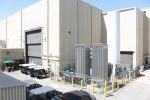Clene Soon Will Complete Phase 2 Trial Testing CNM-Au8

Note: This story was updated Sept. 21, 2021, to note that 18% of patients, not 80%, experienced increases in the MUNIX(4) sum score at some point during the study.
The last patient visit has been completed in Clene’s Phase 2 trial investigating the potential of CNM-Au8 — which uses nanotechnology to prevent the loss of motor neurons — for the treatment of amyotrophic lateral sclerosis (ALS).
A total of 45 people with the neurological disorder had been enrolled in the Australia-based RESCUE-ALS trial (NCT04098406), and all necessary procedures for its closure are now underway, according to Clene. Topline data is expected in the next couple of months.
“Our clinical trial teams in Sydney are very pleased to have reached this important landmark for RESCUE-ALS” Matthew Kiernan, PhD, Bushell chair of neurology at the University of Sydney, said in a press release.
“It is a tribute to the ALS patients involved in the trial that we were able to recruit for the trial throughout the COVID-19 pandemic,” Kiernan said.
“ALS patients have shown great resilience and a willingness to contribute to research and discovery. Now, like them, we look forward to the trial analysis and outcomes,” he added.
CNM-Au8 is a liquid suspension of gold nanocrystals capable of entering the brain and promoting nerve cell function and survival. It works by increasing energy production in cells and removing toxic metabolic waste.
The RESCUE-ALS trial was designed to evaluate the safety and efficacy of CNM-Au8. The study also is assessing the therapy’s pharmacokinetics — a medicine’s movement into, through, and out of the body — and its pharmacodynamics, or how it affects the body.
Participants were randomly assigned to receive 30 mg of CNM-Au8, or a placebo, each morning for 36 weeks (about eight months), in addition to standard care treatment. After this part, 90% of patients opted into an open-label extension part, in which all are receiving the active treatment for up to two years.
The trial’s main goal is to determine changes in the number, function, and health of motor neurons, or nerve cells, controlling hand, arm, leg, and feet muscles. Researchers used the Motor Unit Number Index score, or MUNIX(4) sum, which is a good predictor of clinical decline, to evaluate the changes.
Secondary efficacy goals include changes in the ability to perform activities of daily life — as assessed with the ALS Functional Rating Scale revised (ALSFRS-R) — lung function, and quality of life.
The results showed that about 18% of all participants had increases in the MUNIX(4) sum score at some point during the study, indicative of improved motor neuron survival and function. Also, patients experienced a generally lower decline in lung function (about 18% over the 36 weeks), than anticipated based on data from previous trials.
However, data from the trial is still blinded, and it remains unknown if the observed benefits come from patients assigned to CNM-Au8 or from those on a placebo.
“Thus far the blinded interim data we have seen on the primary and secondary endpoints of our RESCUE-ALS study are very encouraging. We look forward to the unblinded topline readout before the end of the year,” said Robert Glanzman, MD, CEO of Clene.
“We are grateful to the patients and their families for participating in this important study and are hopeful that those who continue to be treated under the open label extension may continue to benefit from CNM-Au8,” Glanzman added.
Clene and its subsidiary, Clene Nanomedicine, also are evaluating CNM-Aug in the HEALEY ALS platform trial (NCT04297683), which is investigating multiple potential disease treatments at the same time to speed the development of those most promising.
CNM-Au8’s trial arm (NCT04414345), which reached 50% of its target enrollment in March, will include 160 adults with sporadic or familial ALS.
Of note, the RESCUE-ALS study was partly funded by FightMND, a nonprofit charity created to raise awareness about motor neuron disease in Australia.








